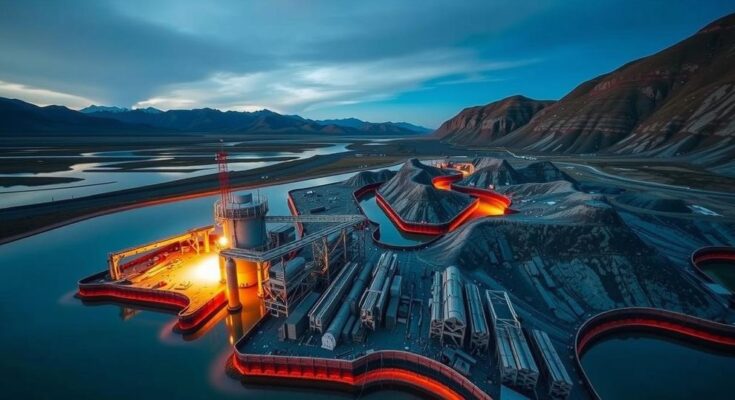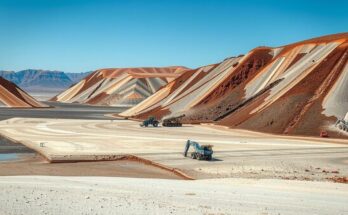The Chinese consortium CBC has signed a $1 billion deal with Bolivia to establish two lithium extraction plants in the Uyuni salt flat. The Bolivian government will maintain a 51% stake, with an annual output estimated at 35,000 metric tons of lithium. The project, involving CATL, aims to bolster China’s foothold in North America’s EV market under current geopolitical challenges.
China’s CBC consortium has formalized an agreement with the Bolivian government to extract lithium, committing to a substantial investment of at least $1 billion. Under this arrangement, CBC will construct two direct lithium extraction facilities in Bolivia’s Uyuni salt flat, a crucial site within the lithium triangle, which spans Bolivia, Chile, and Argentina. The Bolivian government will retain a 51% share in these extraction operations, potentially securing significant local economic benefits.
Omar Alarcon, the head of Bolivia’s state-run lithium company YLB, reported that the estimated production from these plants will reach 35,000 metric tons of lithium annually. The planned output includes 10,000 tons of lithium carbonate annually from one plant and an additional 25,000 tons of battery-grade lithium carbonate from the second facility. Alarcon noted that the operation will employ CBC’s proprietary technology and entail construction financed fully by the consortium itself, representing initial construction costs of $1 billion.
The involvement of CATL, a prominent battery supplier, in the CBC consortium suggests strategic motivations to enhance the competitive edge of Chinese electric vehicle manufacturers in the North American market. However, future dynamics of China’s integration into North America’s supply chain remain precarious, particularly with the incoming administration of President-elect Trump contemplating stringent regulations affecting Chinese products and investments. Notably, CATL expresses optimism regarding successful entry into the U.S. market.
This investment underscores the increasing global demand for lithium, primarily driven by the electric vehicle (EV) industry. Bolivia houses one of the largest lithium reserves globally, particularly significant for countries looking to reduce fossil fuel dependency and transition toward renewable energy. The Uyuni salt flat is central to this endeavor due to its high lithium content, which is essential for producing lithium-ion batteries that power electric vehicles. The partnership between China and Bolivia marks an important strategic move in the context of global supply chain dynamics, especially concerning resource extraction and clean energy developments.
In summary, the Chinese consortium CBC’s investment in Bolivia represents a pivotal development in the lithium sector, facilitating the extraction of valuable resources necessary for global electric vehicle production. The shared ownership model with the Bolivian government signifies local engagement in resource management, while battery supplier CATL’s involvement highlights the strategic importance of these assets for China’s EV market prospects. However, geopolitical uncertainties surrounding U.S.-China relations pose challenges to future operations. Therefore, monitoring the regulatory landscape will be crucial to understanding the long-term viability of this partnership.
Original Source: www.teslarati.com




